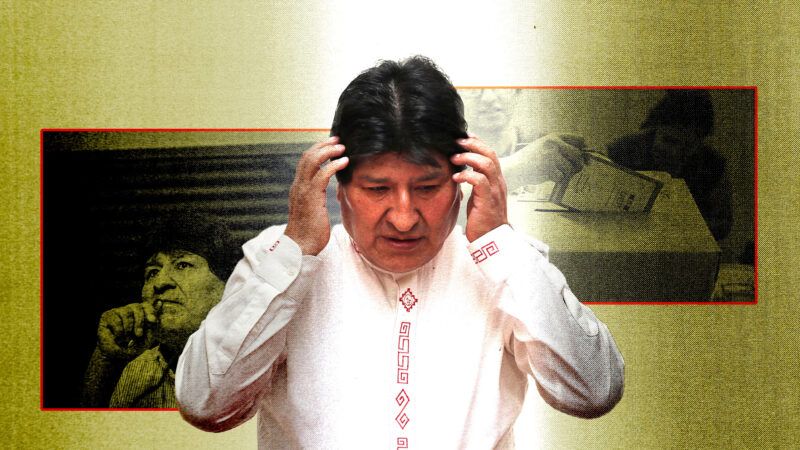Socialism Just Imploded in Bolivia
Is this the last gasp of Latin America's disastrous "pink tide"?

Two decades ago, democratic socialism was rising in Latin America. The so-called "pink tide" swept leftist leaders into power in Venezuela, Brazil, Argentina, Nicaragua, Ecuador, Peru, and Bolivia.
Their useful idiots in the U.S. were delighted. Linguist and political commentator Noam Chomsky saw "seeds of a better world" in Venezuela. Filmmaker Michael Moore praised Venezuelan strongman Hugo Chávez as a champion of the poor. Nobel laureate Joseph Stiglitz claimed he was witnessing an "economic miracle" in Argentina. Sen. Bernie Sanders (I–Vt.) said Bolivia's socialist government had improved the lives of the poorest, giving indigenous people a voice. Former President Barack Obama called Brazilian President Lula da Silva the "most popular politician on Earth."
The dream collapsed, to put it mildly.
Venezuela and Nicaragua have sunk into authoritarianism. Argentina endured a period of economic collapse marked by hyperinflation and widespread poverty. Lula's movement landed Brazil in a historic recession with a 12 percent unemployment rate. In Colombia, President Gustavo Petro, a former leftist guerrilla, pushed debt to alarming levels, while growth slowed.
Recent failures on the left have not guaranteed a lasting realignment, but they have opened space for leaders who promise a radical alternative.
Argentina's libertarian president, Javier Milei, has turned fiscal shock therapy into a political calling card, and the payoff is visible as inflation cools, poverty falls, and growth returns. In Ecuador, Daniel Noboa secured a second term by blending tough security policies at home with pragmatic economic partnerships abroad, striking new deals with China while maintaining close ties to the U.S. Colombia is poised to move sharply to the right in next year's election, with one leading contender, the conservative journalist Vicky Dávila, sounding a lot like Milei.
The most recent reversal is happening in Bolivia, where voters just rejected democratic socialism by a lopsided margin. The results mark a sharp turn away from the policies of former President Evo Morales, which have brought immense suffering to the country. In last week's election, the once-dominant Movement Towards Socialism (MAS) barely cleared 3 percent of the vote.
The socialist project "imploded by itself," Bolivian policy analyst Rolando Schrupp tells Reason, citing public exhaustion after nearly two decades of rule.
The collapse of MAS tracks the fall of Morales, the movement's disgraced former leader. A former coca growers' union leader, he became Bolivia's first indigenous president in 2005, at the height of the pink tide. He pursued sweeping nationalizations in hydrocarbons, telecom, and mining, channeling revenues into social programs and infrastructure. The formula worked for a time: Morales won three consecutive elections, but frustrations mounted as he maneuvered to stay in power indefinitely.
Allegations of fraud in his fourth run in 2019 forced Morales to resign under pressure from mass protests and the military. Since then, he has grown increasingly isolated, retreating to his coca-growing strongholds in the Bolivian Andes. There, he has taken refuge from an arrest warrant on sexual abuse allegations from at least five accusers—charges he dismisses as political persecution. Now a fugitive, Morales remains symbolically present yet politically sidelined.
Bolivia celebra mañana elecciones presidenciales.
El expresidente Morales no ha podido presentar su candidatura y promueve la protesta en un contexto de fuerte crisis económica.
Un equipo de RTVE, con @AnaJimenezTV, ha estado con Morales. https://t.co/NxeyEANX8p pic.twitter.com/inIfB2T9M9
— Telediarios de TVE (@telediario_tve) August 16, 2025
By 2025, the party's economic model had collapsed. "Inflation, fuel shortages, and a devaluation that wiped out wages hit the popular base hardest," Carlos Aranda, an economist with the Centro de Políticas Públicas para la Libertad, tells Reason. "People feel like they are paying the price for decades of fiscal irresponsibility." Bolivia's net reserves fell from roughly $14 billion a decade ago to about $2 billion today. Annual inflation hit 25 percent, and fuel shortages forced drivers to queue for hours—sometimes sleeping overnight in their cars—for a few gallons of gas.
With the socialist party out of the way and Morales sidelined, the field has narrowed to two candidates: Sen. Rodrigo Paz and Jorge "Tuto" Quiroga. They will face off in Bolivia's first-ever runoff on October 19.
Paz, 57, the son of former President Jaime Paz, emerged as the surprise frontrunner with 32 percent of the vote. Rising from just 2 percent in early polls, he built momentum as a pragmatic centrist who attracted disillusioned MAS voters and moderate urban professionals. His running mate, Edman Lara, once a police officer and now an anticorruption social media influencer, added energy to the ticket. Political scientist Oscar Mario Tomianovic, an analyst at the Centro de Estudios Populi, tells Reason that Paz's performance was "perhaps the greatest electoral surprise since Bolivia's return to democracy," attributing it to the disqualification of rivals, Lara's outsider appeal, and a quiet, low-cost campaign that connected with undecided voters.
His rival, Quiroga, 65, is a conservative technocrat who briefly served as president in 2001–02 and has long cast himself against Morales. Educated in Texas, he campaigns on free markets and fiscal austerity, promising "radical change" through shock-therapy reforms and a potential deal with the International Monetary Fund. Tech entrepreneur Juan Pablo Velasco is his running mate, marketing the ticket as a modernizing "liberal duo." While Quiroga isn't a libertarian, his calls for fiscal discipline and subsidy cuts echo Argentina's Milei.
The runoff is less about ideology than style. Paz embodies a pragmatic, flexible center, while Quiroga offers the more traditional profile of a center-right technocrat. Yet popularity doesn't necessarily translate into governing ability, and Bolivia's collapsing economy may overwhelm whoever wins.
Is Latin America shifting toward freer markets, especially with Milei showing early success in slowing inflation in Argentina? Bolivia's rejection of democratic socialism may be the pink tide's starkest reversal yet. But Latin American voters tend to go back and forth in waves. The pink tide might be over, but don't be surprised if it comes back to wash chaos over the region once again.


Show Comments (94)